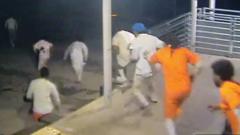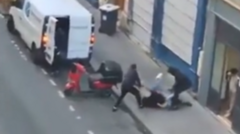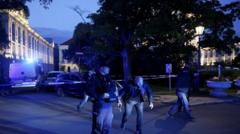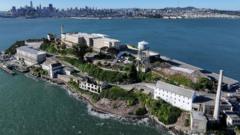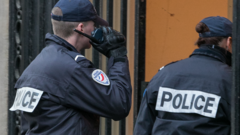Mirebalais, a town crucial for transportation routes, has become the latest battleground as gangs intensify their violent campaign, releasing inmates and raising alarm among local communities.
Haiti Faces Escalating Violence as Gangs Raid Prison and Release 500 Inmates
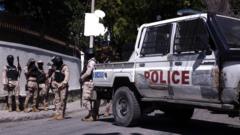
Haiti Faces Escalating Violence as Gangs Raid Prison and Release 500 Inmates
A coordinated attack highlights the worsening grip of armed gangs in Haiti and the implications for the nation's security.
In a shocking escalation of violence, armed gangs stormed the town of Mirebalais, Haiti, on Monday, managing to liberate approximately 500 inmates from the local prison. This brazen assault is indicative of the growing power of gangs outside the capital, Port-au-Prince, with armed groups reportedly seeking to extend their control over critical transportation routes.
Haiti's National Police confirmed that additional forces were dispatched to the area, located about 50 kilometers north-east of Port-au-Prince, but local reports indicate that many of the escapees remain at large. The attack, perpetuated by members of the notorious 400 Mawozo and the "Taliban" gang, witnessed armed men firing upon buildings and civilians, igniting vehicles, and setting structures ablaze as residents fled in terror.
Eyewitness accounts suggest that the assault targeted the local police station before breaching the prison, where around 500 detainees were held. The two gangs involved are part of the Viv Ansam coalition, which has come to dominate parts of northern Port-au-Prince. Their motives appear linked to seizing control of essential pathways leading out of the city.
The 400 Mawozo gang has gained notoriety for its kidnap-for-ransom tactics, often targeting buses on the routes between the capital and coastal areas. The Taliban gang operates predominantly from Canaan, a northern suburb of Port-au-Prince. This latest assault follows the recent murder of Kenyan police officer Benedict Kabiru, who was killed by gang members while on duty, highlighting the perilous conditions faced by the multinational security forces attempting to assist Haiti’s beleaguered national police.
Last year, over 5,600 lives were lost due to gang-related violence in Haiti, with an additional 2,212 injuries and 1,494 kidnappings reported in 2024 alone, according to United Nations statistics. The persistence of these crises raises urgent questions about the effectiveness of international support and the security situation in Haiti as communities grapple with intensified violence. The tragic events underscore the urgent need for comprehensive strategies to combat gang rule and restore peace in Haiti.
Haiti's National Police confirmed that additional forces were dispatched to the area, located about 50 kilometers north-east of Port-au-Prince, but local reports indicate that many of the escapees remain at large. The attack, perpetuated by members of the notorious 400 Mawozo and the "Taliban" gang, witnessed armed men firing upon buildings and civilians, igniting vehicles, and setting structures ablaze as residents fled in terror.
Eyewitness accounts suggest that the assault targeted the local police station before breaching the prison, where around 500 detainees were held. The two gangs involved are part of the Viv Ansam coalition, which has come to dominate parts of northern Port-au-Prince. Their motives appear linked to seizing control of essential pathways leading out of the city.
The 400 Mawozo gang has gained notoriety for its kidnap-for-ransom tactics, often targeting buses on the routes between the capital and coastal areas. The Taliban gang operates predominantly from Canaan, a northern suburb of Port-au-Prince. This latest assault follows the recent murder of Kenyan police officer Benedict Kabiru, who was killed by gang members while on duty, highlighting the perilous conditions faced by the multinational security forces attempting to assist Haiti’s beleaguered national police.
Last year, over 5,600 lives were lost due to gang-related violence in Haiti, with an additional 2,212 injuries and 1,494 kidnappings reported in 2024 alone, according to United Nations statistics. The persistence of these crises raises urgent questions about the effectiveness of international support and the security situation in Haiti as communities grapple with intensified violence. The tragic events underscore the urgent need for comprehensive strategies to combat gang rule and restore peace in Haiti.

